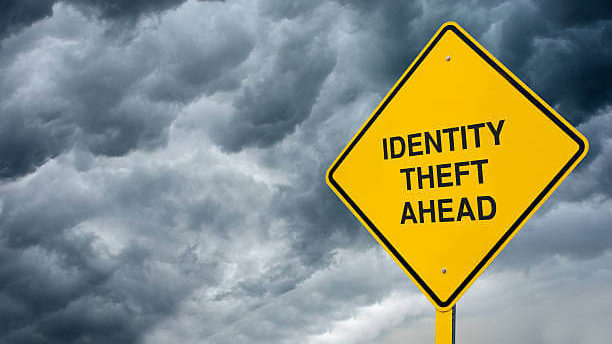What Are The First Signs of Identity Theft?

Identity theft is one of the most virulent and destructive forms of cybercrime activity in the United States. Victims of this type of crime can suffer from damaged credit reports, fraudulent taxes, and chronic anxiety or stress.
If an identity thief uses your personal information to claim medical benefits or prescription drugs, your healthcare provider could end up giving you the wrong pills or medication. You might also lose the ability to file for taxes and request refunds.
For your own emotional, financial, and social security, it’s critical that you’re aware of the warning signs that your identity has been stolen. Once you know which signs to look for, you can take suitable steps to limit the damage caused by this identity theft.
✎ Read Also: The 6 Biggest Identity Theft Cases ➔
What is Identity Theft and How Does it Happen?
When a criminal commits identity theft, they are stealing your personal or financial information. If they take your personal information, they’ll have access to critical data that serves to identify you as an individual, like your Social Security Number (SSN), email address, cell phone number, full name and title, home address, and date of birth.
If a cybercriminal retrieves your financial data, they’ll have access to your account details, credit card numbers, and even your specific login information for your online banking.
There are many ways in which criminals and organizations can steal your identity and data. Here are a few of the major ones to look out for.
1. Getting your wallet stolen
If your wallet falls into the wrong hands, thieves can use your credit card numbers to buy items online or to forge a fake card based on your stolen financial data.
2. Clicking on phishing links
Phishing scams work by an individual or criminal collective impersonating a business or organization you may already use and emailing or texting you a link or attachment to click on.
If you open this attachment or click this link, you’ll unwittingly install malware, ransomware, or spyware onto your phone, tablet, or laptop. These forms of computer viruses can scour your device for financial and private data. They can also send out more phishing links to your business and personal contacts.
3. Giving out important personal and financial data on a public site
When you give out crucial bits of personal and financial data on public websites, identity thieves can harvest this information and use it to impersonate you, damage your credit report, and claim medical benefits in your name.
4. Using a weak password for every login
If you use a predictable, short, and common password for your online banking login, social media pages, and email account, it’s more likely that identity thieves can guess these keywords or phrases and gain access to your sensitive information.
5 Warning Signs of Identity Theft
- Anonymous or unexplained withdrawals from your bank account
- You can’t find your bills or mail
- Your phone loses service
- You’re not allowed to file taxes
- Your health records are inaccurate and your medical claim has been revoked
Identity theft is a serious crime that affects nearly 10 million American citizens every year. Victims of stolen identity often have to deal with a destroyed credit report, debt, rejected medical claims, and, in extreme cases, an unexpected criminal record.
Fortunately, there are several steps you can take to limit the effects of identity fraud. However, before you can take these steps, you should be aware of how to spot identity theft in the first place. Here are some crucial warning signs that your identity might have been stolen.
1. Anonymous or unexplained withdrawals from your bank account
Make sure you check your account balance regularly to see if there are any unauthorized or unexplained withdrawals. If someone has stolen your credit card number and financial details, they may spend a lot of your money in a short space of time. This is because certain credit cards will stop working if there’s a suspicion that fraudulent activity is taking place, so the criminal knows that they don’t have much time.
If you spot a flurry of unauthorized large payments on easily returnable items like electronics and jewelry from your bank account, this is a surefire sign that a cybercriminal has stolen your financial identity.
Some thieves may be more careful with their transactions so as not to alert you to the fact that they have your personal and financial data. That’s why it’s so important that you check your transaction history carefully and regularly. Look for out-of-state activity, unexplained ATM withdrawals, and gift card purchases.
2. You can’t find your bills or mail
Identity thieves can break into your mailbox or search through your trash can to get their hands on useful pieces of documentation like your income statements, bank statements, and electricity or internet bills. They can use this data to start up new subscriptions under your name or upgrade your existing accounts to suit their purposes.
If you start getting billed for a service or streaming platform that you never signed up for, this could be a sign of identity theft. Also, if you can’t find any of your monthly bills for services you do use, this might be because a criminal has stolen them.
✎ Related: How To Dispose of Sensitive Documents At Home? ➔
3. Your phone loses service
If you notice that your cell phone loses service for no apparent reason, this could mean that an identity thief has taken over your cellular network account and upgraded to a premium phone service without your knowledge.
4. You’re not allowed to file taxes
Government identity theft is a particularly severe form of cyber fraud. If you’re a victim of this crime, you’ll find that you can’t file your taxes with your state or federal government. That’s because criminals can use your SSN and other essential pieces of personal data to file these taxes before you get a chance to. They do this to claim a tax refund, or reimbursement, from the Internal Revenue Service (IRS) or state.
5. Your health records are inaccurate and your medical claim has been revoked
Some thieves use your stolen identity to claim medical benefits, prescription drugs, and other healthcare services in your name. This means that your doctor receives inaccurate data about your health conditions and may be unable to treat you properly as a result. It also means you’ll end up paying for a stranger’s healthcare and treatment.
Conclusion
Identity theft affects millions of Americans every year, so it’s crucial that you check your bank account details, transaction history, and medical records regularly so you can tell immediately if someone has stolen your identity or data. If you think your identity has been stolen, follow the Federal Trade Commission’s step-by-step guide to prevent further damage and recover lost funds.
Related Articles About Identity Theft:
